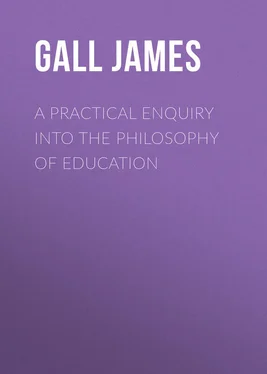Here, then, we have an example of Nature herself dividing an audience into different classes, and that by one and the same operation, – by one reading, – forming in each class part of a regular analytical table of the whole history, each class being one step in advance of the other. The first has the foundation of the whole fabric broadly and solidly laid; and it is worthy of remark, that there is not one of the ideas acquired by the most talented of the hearers, that is not strictly and regularly derived from some one or other of the three general divisions possessed by the first and the least advanced; and any one of the ideas may be regularly traced back through the several divisions to the root itself. The additional facts possessed by the second class, are nothing more than a more full developement of the circumstances remembered by the first; and those obtained by the third, are but a more extensive developement of the facts remembered by the second.
This being the state of the several classes into which Nature divides every audience, it is of importance to trace the means which she employs for the purpose of advancing each, and of ultimately completing the analysis; or, in other words, perfecting the knowledge of the narrative, in each individual mind. This is equally beautiful, and equally simple. It is, if we may be allowed the expression, by a regular system of building. The foundation being laid, and the frame-work of the whole being erected, in the knowledge of the great general outline, confusion is ever after completely prevented. Every piece of information connected with the history, which may be afterwards received, has a specific place provided for it. It must belong to some one or other of the three great divisions; and it is there inserted as a part of the general building. It is now remembered in its connection, till all the circumstances, – the whole of the information, – gradually, and perhaps distantly received, complete the narrative.
To follow out this plan of Nature regularly, as in a school education, the method must be exceedingly obvious; for if the first class, by once hearing the chapters read, have received merely the outline, – the frame-work of the narrative, – it must be obvious, that when this has by reflection become familiar, a second reading would enable them to fill up much of this outline, by which they would be on a par with the second. Another reading would, in like manner, add to the second, and form a third; and so forth of all the others. Each reading would add more and more to the knowledge of the pupil; and yet, every idea communicated would be nothing more than a fuller developement of the original outline, – the frame-work, – the skeleton of the story which he had acquired by the first reading. By successive readings, therefore, the first class will take the place of the second, the second of the third, and so on to the end. This is Nature's uniform method of perfecting her pupils in any branch of connected knowledge; – a method which, therefore, it should be the object of the Educationist to understand, and closely to imitate.
From the cases which we have in this chapter supposed as examples, there are several important practical inferences to be derived, to which we shall here very briefly advert.
In the first place, we are led to infer, from all the cases brought into notice, that every kind of external force, or precipitation in education, is abhorrent to Nature. In each of the cases supposed, we have a remarkable exhibition of the calm serenity of Nature's operations in the education of the young. For instance, in the last case supposed, the children all listened, – they all heard the same words, – the mental food was the same to each, however diversified their abilities might be; and it was indiscriminately offered in the same form to all, although all were not equally prepared to receive and digest it. The results accordingly were, in fact, as various as the number of the persons present. And yet, notwithstanding of all this, there was no hurry, no confusion, no attempt to stretch the mind beyond its strength. Each individual, according to his capacity, laid hold of as much as his mind could receive, and silently abandoned the remainder. – But if there had been any external urgency or force employed, to compel the child to accomplish more than his mind was capable of, this serenity and composure would have been destroyed; irritation, and confusion, and mental weakness, would have been the consequence; and altogether, matters would not have been made better, but worse, by the attempt.
Another inference, which we think may legitimately be drawn from the above examples, is this, that although Nature prompts the child silently to throw off or reject that which the mind at the time cannot receive, yet it would be better for the child if no more had been pressed upon him than he was capable of receiving. The very rejection of any portion of the mental food presented for acceptance, must in some measure tend to dissipate the mind, and exhaust its strength. This we think is demonstrated by the fact, that the child had to listen for an hour
Конец ознакомительного фрагмента.
Текст предоставлен ООО «ЛитРес».
Прочитайте эту книгу целиком, купив полную легальную версию на ЛитРес.
Безопасно оплатить книгу можно банковской картой Visa, MasterCard, Maestro, со счета мобильного телефона, с платежного терминала, в салоне МТС или Связной, через PayPal, WebMoney, Яндекс.Деньги, QIWI Кошелек, бонусными картами или другим удобным Вам способом.
Note A.
Note A.
Note B.
Note C.
Note D.
Note E.










